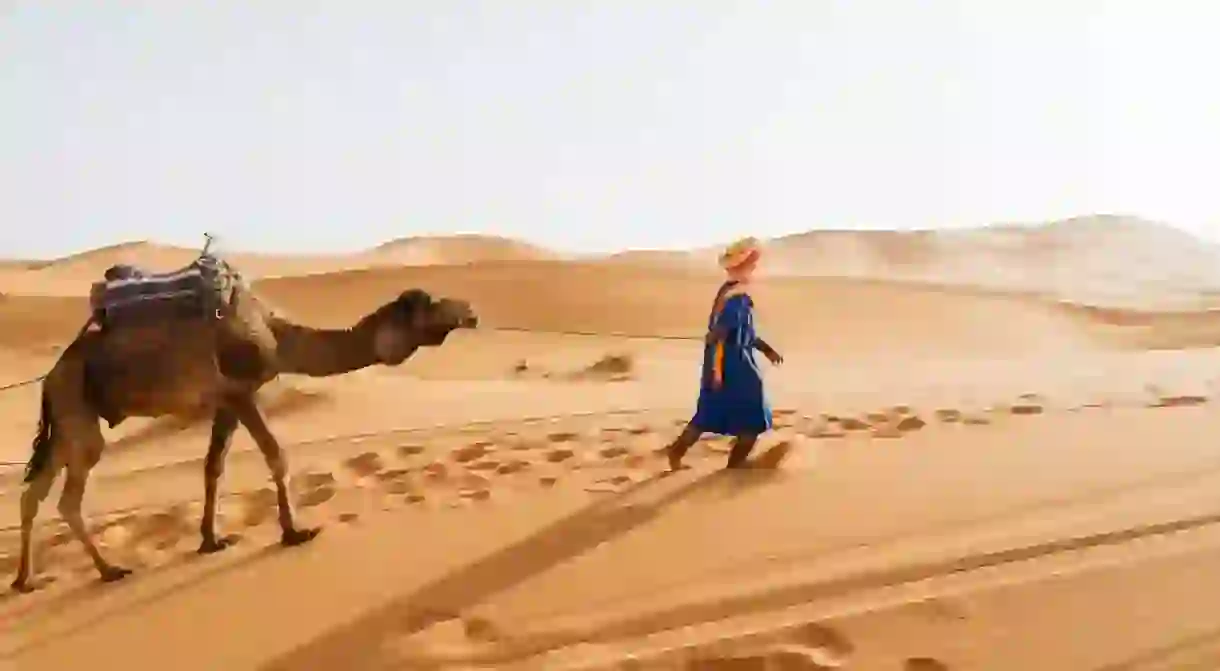A Guide to Trekking Morocco's Scorching Desert

Morocco offers relatively easy access to the spectacular Sahara Desert, the largest hot desert on earth. With enormous dunes, seemingly endless expanses of sand, an unpredictable climate, sparkling oases, and hardy flora, the inhospitable and extreme area is a magnet for adventure seekers when visiting Morocco. Here’s how to plan and prepare for a trekking trip in the desert, and some handy tips to make your expedition a success.
Best Places for Desert Trekking in Morocco
Merzouga and Zagora are the two most common destinations for people looking to explore the mighty Sahara Desert. In addition to day treks you can also arrange longer multi-day treks, venturing farther afield into the arid terrain.

What to Pack for a Desert Trip
Packing light is essential for any Sahara trip. Even if you won’t be carrying your own overnight bags yourself, a porter will have to transport your gear. While the daytimes are hot, many people are surprised at how dramatically the temperatures fall after sundown.

Take a light jacket and/or sweater for evenings in the desert. Although you may be tempted to wear T-shirts and shorts during the hot days, keeping your skin covered with long-sleeved light-weight T-shirts and light pants is the best way to avoid sun burn. Dressing for comfort and safety beats dressing for style. Sun cream is essential.
A scarf is a must-have on a Sahara trek in Morocco. Light-weight and versatile, a scarf can cover your head and face at the same time, stopping the sun from burning you and your throat from being clogged up with sand when the wind blows. Sunglasses help to protect your eyes. Well-worn-in hiking shoes or boots plus appropriate thick, breathable socks are vital. Flip flops are ideal for late-night toilet visits and chilling out in the evenings.

Other things to pack include any essential medications plus a basic first aid kit, toilet paper, baby wipes, and hand sanitiser. Check with your tour operator if you need to take your own sleeping bag. Take your own personal hygiene supplies, such as a toothbrush and toothpaste, hair brush, etc. A torch and a refillable water bottle should also be on your packing list.
Pack light when it comes to electronics. Your camera, phone, spare batteries, and chargers (plus relevant adapters) are probably all that you’ll need.
Essential Mindset and Physical Ability for Desert Trekking
You will need to be reasonably fit to enjoy trekking in the Sahara. You will also need a sense of adventure, a strong spirit, and a certain amount of determination. Sahara trekking can be challenging at times, and you should be mentally and physically prepared for your experience.

Know that sleeping conditions can be basic, and that there will likely be times when you feel uncomfortable, both when trekking and when sleeping.

When to Visit the Sahara Desert
Spring and autumn are the best months for trekking in the Sahara Desert. The summer temperatures soar, and winters can be very cold, especially at night. Keep in mind that sandstorms can occur between January and May.

Other Desert Activities
While basic accommodations are available in some areas, camping often goes hand in hand with a desert trek. Camel riding and ATV adventures can be combines with regular trekking to allow you to cover more ground. Sandboarding and hiking dunes may also be available.

Local Culture and Etiquette in the Sahara
The vast majority of people who live in Morocco’s desert regions are Berbers. Joining a Sahara trek provides the opportunity to see the local way of life as well as being awed by the sandy landscapes. Locals are known for their hospitality, often offering food or a glass of mint tea to travellers. Be sure to only take what you need when offered food and avoid wasting items unnecessarily. Remember, as with everywhere in Morocco, to only use your right hand to eat from communal dishes. Ask permission before taking photos of a person or their home.

Water is a scare commodity in the Sahara. Do not waste water. Avoid, for example, using water from your drinking bottle to pour over your body for a quick wash. You can shower when you leave the desert! Don’t drop litter in the desert.

Dress modestly to avoid offending locals; as a general rule you should cover your shoulders and to your knees. A desert experience can be romantic; if travelling in Morocco with your significant other be sure to avoid public displays of affection and save the tender kisses for when in the privacy of your room or tent. Do also remember that canvas doesn’t offer much sound-proofing; trekking trips aren’t the time for nocturnal adult fun!

You could consider purchasing local handicrafts to help support Saharan communities. Haggling is common, but do keep in mind that people are trying to make a living. Don’t be stingy when it comes to tipping your guide at the end of your trip.
Independent Adventures Versus Tours
It is possible to travel to the border towns independently and arrange a local guide to accompany you into the desert. Many visitors, however, book a package before leaving the countries larger cities such as Marrakech, Casablanca, and Fes. However you choose to enjoy the desert, having the support and guidance of a knowledgeable and professional guide is essential. There are many tour companies to choose from, with an assortment of activities to choose between.















